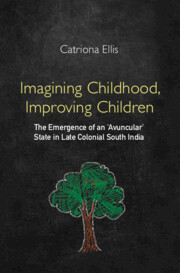 Imagining Childhood, Improving Children
Imagining Childhood, Improving Children Book contents
- Frontmatter
- Dedication
- Contents
- Acknowledgements
- List of Abbreviations
- Introduction
- 1 The Child at School: Compulsory Education in the Madras Presidency
- 2 Educating the Child: The Introduction of Compulsory Education in Madras City
- 3 Imagining the Child as Learner: Progressive Pedagogy in the Madras Presidency
- 4 Producing the Healthy Schoolchild
- 5 Saving the Child: The Madras Children Act, 1920, and the Beginnings of a Juvenile Justice System
- 6 Protecting the Poor Child: The Practical Expansion of Juvenile Justice
- 7 Defining Childhood: Sexual Parameters of Childhood
- 8 Remembering Childhoods: Childhood Memories in Autobiographies
- Conclusion: Children, Childhood and the Growth of the Avuncular State in South India
- Notes
- Bibliography
- Index
Conclusion: Children, Childhood and the Growth of the Avuncular State in South India
Published online by Cambridge University Press: 19 April 2023
- Frontmatter
- Dedication
- Contents
- Acknowledgements
- List of Abbreviations
- Introduction
- 1 The Child at School: Compulsory Education in the Madras Presidency
- 2 Educating the Child: The Introduction of Compulsory Education in Madras City
- 3 Imagining the Child as Learner: Progressive Pedagogy in the Madras Presidency
- 4 Producing the Healthy Schoolchild
- 5 Saving the Child: The Madras Children Act, 1920, and the Beginnings of a Juvenile Justice System
- 6 Protecting the Poor Child: The Practical Expansion of Juvenile Justice
- 7 Defining Childhood: Sexual Parameters of Childhood
- 8 Remembering Childhoods: Childhood Memories in Autobiographies
- Conclusion: Children, Childhood and the Growth of the Avuncular State in South India
- Notes
- Bibliography
- Index
Summary
The post-independence Indian Constitution of 1950 is often assumed to have fundamentally altered the relationship between the child and the state. This book demonstrates that many of the principles contained within it, for example, access to elementary education for all children as a right guaranteed by the state (Article 45), were part of a much longer trajectory of social legislation. Instead, the 1920s and 1930s were a time of radical change in regard to childhood in India. This reflected discursive and political changes at a national and global level but was linked most clearly to the devolution of power to Indians at a local and provincial level. What is more, these moderate Indian elites were prepared to use the limited powers granted to them under the 1919 and then 1935 Government of India Acts to significantly rethink and change the relationship between the child, the family and the state.
Imagining Childhood, Improving Children
The 1920s and 1930s was the era when the idea of childhood as a universal social category distinct from adulthood, which deserved state protection and investment, became widely accepted by the south Indian political elite. This particularly reflected the elite interest in modern childhood as a universal global formation, accepting a particular view of modern childhood as normative. This commitment to a universal norm precluded any discussion that the meaning of the term ‘modern’ could be reinterpreted or reformulated or have different meanings in different times and spaces. This failure to interrogate the universality of a particular mode of childhood at an intellectual level perpetuated the dominance of one idea as universal and continues to inform attitudes towards childhood within India even today.
Within this broad framing certain aspects of modern childhood were particularly important and marked children as distinct from, rather than inferior to, adults. The first was the assumption that the child was uniquely malleable, that the proper place for the child was in school and that the primary identity of the child was as a learner. The school became the primary space for the interaction between the child and the state, the place where citizenship was learned and performed.
- Type
- Chapter
- Information
- Imagining Childhood, Improving ChildrenThe Emergence of an ‘Avuncular’ State in Late Colonial South India, pp. 230 - 242Publisher: Cambridge University PressPrint publication year: 2023


